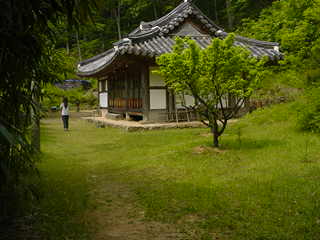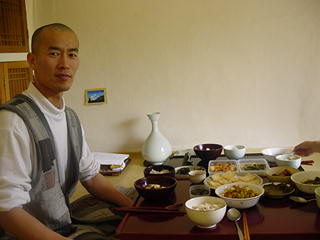Tuesday, May 8, 2012
Groping in the Dark
Jin-soon and I had been talking casually for half an hour when we saw the monk. Tog-hyon emerged from the forest carrying a walking stick and wearing a Buddhist-chic, patchwork vest, baggy, gray monk's pants that tightened around the ankles with knots for buttons, and a large straw hat. He greeted us with a broad smile and bow and before even bothering to learn our names, he invited us into his small hermit's home for tea and lunch. He lived a mile into the forest, away from the principal monastery. He spoke to me in rusty yet precise English. During tea he said that he'd learned English in law school before he became a monk, fifteen years ago.
The warm spring morning covered us with a comforting blanket of fragrant, humid air. This deep into the forest, the whole world seemed to be the brightest most vivid green of new leaves beginning to spring from the trees. How could the world sustain such a fresh and new vitality?
It was 2003. I had been in Korea teaching English and studying meditation for almost a year. My dear Jin-soon (fellow teacher and guide to all the best things Korean) had invited me to come and visit her favorite monastery, where visitors get to live like monks for a while and find solace.
We sat down on the floor as Tog-hyon prepared the tea. Eager to begin conversation, I mentioned that it was very peaceful there at his hermitage, and without my knowing it, my lessons had begun. "Why do you say that it is peaceful here?" he inquired with that sage smile of his. I fumbled for something to say, sensing I had made a faux-pas and that my logic was about to be mercilessly squashed. "The peace we have can only come from within. Otherwise, it will always leave us. We are doomed for sadness if we base our happiness on things that are constantly changing." He stared deeply into my eyes.
After lunch Jin-soon offered to do the dishes and just before I jumped in to help, Tog-hyun arrested my gaze and asked me if I would go on a walk with him. I regretted that Jin-soon was going to miss this because of her offer to wash dishes. But it was just him and me.
We met a thin yet worn path that began near his house. He quietly walked along the path through the bamboo forest as I followed on his heels. I instinctively began to do the museum walk, hands clasped behind my back. I do this when I don't want to disturb the beauty and priceless art around me.
We walked for a few minutes until we came to a bamboo barrier lying across the path that was obviously made by him. There was a sign on the post in neat Korean. He pointed to it and pronounced, "This says that this place is not for just anyone. But you're not just anyone," and lifted up the barrier for me to pass. A few more minutes and we came to a small building, which looked like an organized sculpture of the trees and orange clay of its immediate environs. There were tree posts supporting it, a curved, tiled roof, and a large wooden deck. "I built this with three other monks. I had a very difficult time," he said, laughing. "Let's meditate." He offered me the only mat on the porch and we both sat down, cross-legged, and stared out into a vast, unspoiled mountain vista. West. Again, my meditation was deep and peaceful. My eyes were open. What is this spirit inside me? I thought. That seems to be the six-million dollar question, here. Again, I became very still. I stared at a tree in the distance. It was different than those surrounding it. It was a lone dark-green tree in an ocean of lightly colored spring-green trees. I felt like that tree was me.
After 20 minutes, Tog-hyun said, "Do you hear the wind blowing through the pines? There's an old Zen poem that says, 'What is the price of the wind blowing through the pines?' So I ask you. . ." (Damn! here comes another question!) ". . .what is the price of the wind through the pines?" I rattled off some light-weight answer like, "The wind, the trees, they are part of us all, part of our soul. Our soul is priceless- "You don't understand me, do you?" he interrupted gently. "I don't understand," I said. "You studied English in the university, and you don't understand?" he kindly goaded me. "Stop thinking about it. You can't use theories to answer the question. You can't use language. You must doubt. You must continually ask the question (Who am I?) and one day you will learn. It will take three days of constant meditation. Even while you are resting, your mind must be pondering the question of the price of the wind through the trees. Someday you will know. Let the blade of doubt cut through the blackness of the mind. Let's go back."
And with that, we stood up and he led me back to his house. He entered and this time opened the wooden shutters to the only window in the room. It opened to the West, and he had me sit directly to his left, facing the window. "He's so young and makes many mistakes, but he is very spiritually minded. I can see that," he said to Jin-soon and some other people who had come in our absence.
More tea.
It was time to go. We'd spent almost five hours with Tog-hyun. Before going, I told him that I'd soon be home with family and friends in America and asked him if there was a message of wisdom he would like to send with me. He told me that a message from him wasn't necessary; instead, I must find the message within my own self and share it. I thought I should have learned that lesson by now.
Before leaving, Tog-hyun reached into a closet and gave me a very expensive box of tea. As he walked us to the edge of the hermitage he read the Chinese inscription on the box. "It says, 'Zen and the taste of tea is the same.'" Then without a segue he added, "Continue to doubt. Always doubt." And with that we bowed humbly to him, and left.
It was late. We hiked back to the principal temple grounds and stopped by the Great Hall one more time to make our final bows, grabbed our bags, and took the first bus out. We began our 4-hour trip home and I pondered Tog-hyun's words.
Doubt
When we feel we know, when there is nothing else to search for, we become complacent, stagnant. Surety seems like a comfortable place but it's a damning place. It's the false security of thinking that the journey is over, that there's nothing else to search for or find. Doubt, wonder keeps our eyes open in wonder, keeps us searching and discovering. Let's not mistake doubt for cynicism, mind you. It is doubt that keeps us asking the questions that will lead us to the next mile marker, and the next, and the next. It's doubt that keeps us groping in the dark until we find our way through. But to think you have the answers is to lie and say you've arrived, to sit down and get sleepy, and forget what you are looking for while the grass grows.
Mysteries, Yes, by Mary Oliver
Truly, we live with mysteries too marvelous
to be understood.
How grass can be nourishing in the
mouths of the lambs.
How rivers and stones are forever
in allegiance with gravity
while we ourselves dream of rising.
How two hands touch and the bonds
will never be broken.
How people come, from delight or the
scars of damage,
to the comfort of a poem.
Let me keep my distance, always, from those
who think they have the answers.
Let me keep company always with those who say
"Look!" and laugh in astonishment,
and bow their heads.
Subscribe to:
Post Comments (Atom)




No comments:
Post a Comment